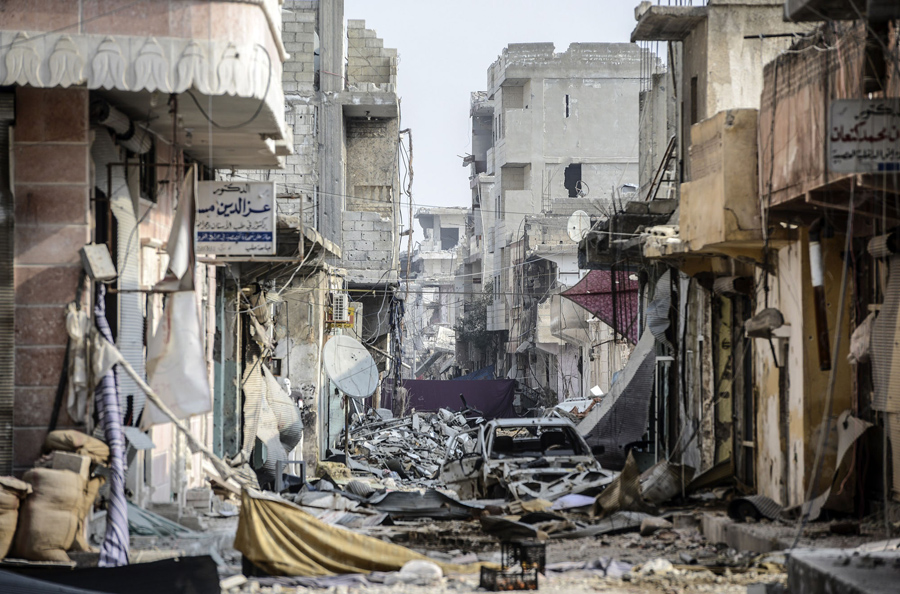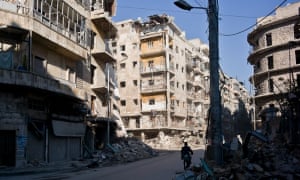Suffering Humanity
"We're allowing a level of destruction we will never have the means to address. They're wiping one city after another off the map."
Peter Harling, International Crisis Group
"We had nothing to stay for. Every house here is damaged. In every house there is the smell of war."
"People are only living here because they don't have any choice and because they suffered too much as refugees."
Abdullah Kurdi, former resident of Kobani, father of Aylan, 3, Ghaleb, 4: dead.
"Aleppo is by far the most devastated thing any of us have ever seen. I call it Stalingrad."
"You have large urban areas that are just gone. They are flattened to all intents and purposes."
Lars Bromley, analyst, satellite imagery, UN Institute for Training and Research
 |
| Wreckage left by fighting on a street in the center of the Syrian town of Kobani, also known as Ain al-Arab, on January 28. Kurdish forces recaptured the strategic town on the Turkish frontier on January 26 in a symbolic blow against ISIS jihadists who have seized swaths of territory in a brutal onslaught across Syria and Iraq -- Bulent Kilic/AFP/Getty Images |
The devastation is mind-boggling; it is so all-encompassing, to be unimaginable to any sane mind. That anyone would set out with the purpose and the determination to destroy the total infrastructure on which people in any civilized society depend to live their daily lives, in a gesture of hatred for their sect, their tribal allegiance, their demands as a majority for equality of opportunities that accrue to the ruling minority, is beyond reason and enters the realm of psychotic savagery.
But this is precisely what the Alawite Shiite regime of Syrian President Bashar al-Assad set out to do when he responded to the peaceful protests over four years ago of Syrian Sunnis who were aggrieved at their lack of opportunity to advance their interests in a country that was their own, ruled by a political-ideological group that oppressed them. Their president took their protests under advisement by arresting and torturing children and other vulnerable people incautious enough to assault his policies.
From there he steadily progressed to starving out through isolation whole communities, by sending helicopter gunships to target bread lines, by having his military commit nighttime chemical bombings, by authorizing the use of barrel bombs whose deadly shrapnel tore people apart. And by creating an atmosphere where fully half of the population of 22-million Syrians fled the terror, to become migrants within the country and refugees outside it.
They are there in their millions, in refugee camps in Turkey, Lebanon, Jordan and Egypt, living in squalid despair with bare accommodation and nothing for children's needs. Ill-treated through the resentment of the surrounding indigenous population, some among them venture to return to their bombed-out villages in Syria rather than live without dignity among those who view them with contempt.
 |
| Aleppo, Syria - whole neighbourhoods have been destroyed during the war. Photo: Jacob Simkin/NurPhoto/Corbis Photograph: Jacob Simkin/NurPhoto/Corbis |
An estimated 2.1-million homes, half of the country's hospitals, and over seven thousand schools have been destroyed in the ravaging conflict, according to United Nations figures. Damage to the country's infrastructure is estimated to be $270-billion; rebuilding is felt to run to over $300-billion, according to Abdallah al-Dardari, a former Syrian government minister now heading the National Agenda for Syria program at the UN's Economic and Social Commission for Western Asia.
The United States, by comparison, spend $30-billion in reconstruction in Iraq. Mr. Dardari vented his opinion: "I don't know who will fund this", in view of the fact that any government would discover itself "ruling over a pile of rubble". One million people have been wounded in the civil war, while 7.6-million have been displaced within the country and four million have become external refugees. That, with the implacable fact that over a quarter of a million Syrians have died over the period of conflict.
The destruction is incredibly dire, but it continues. And the greater the number of buildings destroyed, the more homes lost, the increasing numbers of shops and businesses are flattened, the less people have to leave behind as they run for their lives. Of course, should they wish to return if and when the war is over, there will be nothing for them to return to. When Mr. Kurdi returned to his hometown of Kobani after the death of his wife Rayhan and their two sons by drowning as they left Turkey to attempt to reach Greece, he discovered his family's home entirely destroyed.
The Islamic State terrorists had challenged the Kurds for possession of Kobani. The U.S.-led air bombing mission ultimately aided the Kurds in their battle to re-possess Kobani. President Obama speaks of that victory in ousting Islamic State and restoring Kobani to Kurdish hands as a great victory, one of the greatest triumphs of the war, as outnumbered Kurdish fighters defeated the vicious Islamist invaders. Kobani is a name of a place that once was, now, a town utterly destroyed.
And as such it is a reflection of cities, towns and villages across the country. One of Syria's major cities, Aleppo, has seen over 14,000 buildings destroyed, and other major Syrian cities reflect as well an unforgiving war by a tyrant against his own people. What Islamic State has destroyed is not in quite the same ball park. The threat that ISIL represents because of the visibly proud presentation of the atrocities they commit concerns the world. The threat that the regime has proven itself to be toward humanity is interior and hidden.
But it, largely, is responsible for Europe being flooded with the desperation of refugees, their plight inciting other downtrodden migrants who suffer from dreadful governments in conflict zones and areas of general dysfunction leading to horrendous privation and loss of hope, to join the Syrian hordes, inflating their numbers by haven-seekers from Asia and Africa, countless countries on three continents with one thing in common: the prevalence of Islam.
Labels: Africa, Asia, Civil War, Europe, Islamism, Migration, Rebels, Refugees, Syria
0 Comments:
Post a Comment
<< Home